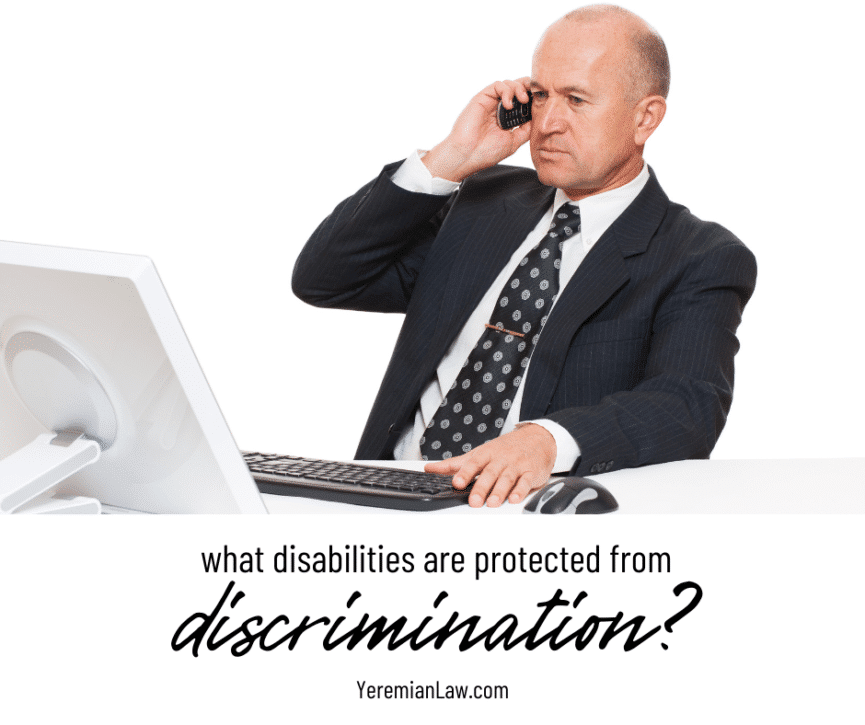Under both federal and California law, people with disabilities are protected from discrimination in the workplace – and that includes during the job application process. In fact, employers aren’t allowed to discriminate against people for a real or perceived disability in any aspect of the employment process, including during job interviews, while doing performance reviews, or even when choosing to terminate an employee.
But which disabilities “count” under federal and state law? This guide explains.
What Disabilities Are Protected From Discrimination?
The federal Americans With Disabilities Act (ADA) and California’s Fair Employment and Housing Act (FEHA) protect Californians with disabilities from workplace discrimination. The ADA covers employers with 15 or more employees, while FEHA applies to California employers with five or more employees.
The disabilities that are protected from discrimination are real and perceived. That means if an employer believes a person has a disability – even if that person doesn’t have it – the employer cannot use it to discriminate against that person.
Some of the disabilities protected under the ADA and FEHA are mental, and some are physical. The following table outlines many of them.
| Anxiety disorder
|
Hepatitis
|
Obsessive-compulsive disorder
|
| Bipolar disorder
|
HIV/AIDS
|
Pregnancy and childbirth
|
| Cancer
|
Impaired eyesight
|
Schizophrenia
|
| Chronic diseases
|
Impaired hearing
|
Specific learning disabilities
|
| Clinical depression
|
Impaired speech
|
|
| Dementia
|
Intellectual disabilities
|
|
| Diabetes
|
Loss of a limb
|
This isn’t a complete list, either – it’s simply a quick run-down of the possible disabilities a person may have that are protected under the ADA and FEHA.
Any condition that affects a person’s day-to-day activities – the ones most people take for granted – can be considered a disability. Some of the day-to-day activities you may experience disruption in may include caring for yourself, performing manual tasks, eating, walking or standing, bending, learning or reading, concentrating or thinking, and working in ways that many other people have no trouble with. Additionally, things that affect the operation of major body functions, such as functions of the immune system, bowel and bladder issues, neurological conditions, endocrine and even circulatory differences can be considered disabilities.
Related: 5 fast facts about pregnancy discrimination
What Can You Do if You’re Discriminated Against Because of a Disability?
Even if your disability isn’t specifically mentioned here, it may still qualify as a disability under federal and state law. If you suspect you were discriminated against because of your disability, you may have legal recourse.
In many, but not all, cases, you must file a complaint with either the Equal Employment Opportunity Commission (EEOC) or the Department of Fair Employment and Housing (DFEH). The EEOC oversees complaints at the federal level, while DFEH oversees California-specific complaints. Which agency you and your attorney choose is up to you, but you should know that California anti-discrimination laws apply to businesses with five or more employees, while the ADA applies to businesses that have 15 or more employees. That may impact where you choose to file your complaint. Your attorney can give you the guidance you need, so don’t worry about which agency is the right one for you until after you’ve gotten legal counsel.
Related: What is CFRA leave?
If the state or federal government elects not to investigate your case, you have the right to sue your employer. In some cases, people are entitled to damages after a successful lawsuit. Those damages may include things like:
- Back or front pay
- Wage increases due to promotion or raises
- Benefits
- Bonus payments
- Pain and suffering or emotional distress
Do You Need to Talk to an Attorney About Disabilities That Are Protected Against Discrimination?
If you’re not sure your disability is recognized – or if you’re not sure whether it qualifies you to file a complaint or a lawsuit against your employer – we may be able to help you. Call our office at 818-230-8380 or fill out the easy form below to schedule your free consultation with an experienced, caring professional.




